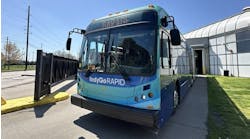Agencies need to get future employees in the pipeline to combat the employee shortage. There are two new, unique programs targeting youth in the community to help them build career plans to become mechanics and police officers.
Getting in on Vehicle Maintenance
IndyGo, the Indianapolis Public Transportation Corp., has partnered with the Arsenal Technical High School to provide youth in the community hands-on experience in maintenance.
Tim Anderson, a truck and diesel technology instructor at the school, explains that it’s a three-year program that starts during a student’s sophomore year and that students get involved in summer internships and co-op programs for the hands-on experience.
“Between ‘08 and ’09, and ‘09 and ‘10 we had our first summer interns,” he says. “Between junior year and senior year they do the internships and then second semester of senior year they do a co-op program where they attend school in the morning for their academics and then they go to work.”
For the co-op, students work at least four hours each day after school, typically leaving school about 10:00.
Anderson says, “They look forward to the internships and it has been a really good experience for all of them.
“They enjoy getting out there and getting some hands-on experience and the money; that’s a big plus for them, too.”
According to IndyGo, its intern Antez Burgess was able to participate in the eight-week summer internship through the support of IndyGo staff, Navistar International’s Truck and Diesel Engine Program and the Conference of Minority Transportation Officials (COMTO). COMTO provided Burgess with a monthly intern stipend.
Over the past summer, students worked as truck and diesel apprentices at IndyGo, an IPS bus repair facility and at Indiana Truck. Where it’s worked well, Anderson employers were willing to keep an open mind and positive mind set; they helped to make it work.
“We can’t make it work and they can’t make it work because it takes all of us working together to make it work,” he stresses.
At IndyGo, 18-year-old Burgess worked directly with the maintenance staff to learn about engine repair, transmissions, shocks, brakes and welding. According to IndyGo, staff was impressed with his work ethic and job performance and has invited him back for a co-op opportunity during his school’s second semester.
As for finding partners for the school, Anderson says it has been somewhat challenging. Many companies say they’re going to do it, but then when it’s time to place the interns, they back out on the program.
“We’ve heard every excuse you can think of,” he says. “We’ve had two or three different places say they had union issues, that the union would have a problem with them.
“And then there’s everything from not enough work to hire them to money issues, that they can’t afford to hire interns.”
With some of the students only 17 years old, Anderson says age has also been an issue; many places tell him the students need to be 18 years old.
“It has been a real challenge,” Anderson stresses.
When asked what companies with this opportunity should consider, he states, “Give these kids a chance. Short and sweet.
“These kids are anxious to go to work and I think they’ll be pleasantly surprised with their knowledge and work they do given the opportunity.”
Preparing Future Police
In Baltimore, at the Maryland Transit Administration, the MTA Police Force has launched a Police Cadet program, offering qualified men and women between the ages of 18 and 20 the opportunity to experience the challenges and rewards of a career in law enforcement.
The one-year program offers cadets classroom and on-the-job training, as well as mentoring by MTA police officers.
MTA Administrator/CEO Ralign T. Wells says the program was started to provide future officers for the department. “The program was started to provide a constant pipeline for ready recruits for our police department and to provide more eyes and ears on our transit system to ensure the feel of security for our customers.
“Also, in order to ensure that youth in the community had an opportunity to move in to a career in law enforcement, so we are actually taking recruits straight from the community, so that’s why we did it.
With the extensive background checks that have to be done for police officers, having young people go through the cadet program after having already gone through all of those checks provides quicker backfill for officers.
The program is funded through the existing budget for fare inspectors and security guards; the cadets are going to be a portion of those. With funding for 60 total positions and always running below that, the cadets will be put in that same pool, from within the existing budget.
One of the obstacles was to work with the union so it understood the benefits of thee program. “Once we relayed the benefits in how it’s going to help the youth in the community where we serve and how it’s going to provide a constant backfill of ready police officers to our system and the fact that it’s going to provide more eyes and ears to give passengers a better feeling of security, everyone pretty much bought in to it,” Wells says.
“Everyone wants the young people of our community to have an opportunity to move forward in their career and that’s why they saw the advantage to having this career path at 18 years old.”
Wells says they are recruiting at the high schools and local community colleges for the program. Once they become a cadet, they have priority over anyone else that applies into the police department once they reach 21; they gain priority hiring status.
The cadets will receive training in all the training that the police offers get in regards to security except handling of a gun. “They’ll have ride-along training with the officers, blood-borne pathogens training, rescue training, track access training,” says Wells. “They’ll also learn the terrain about the specific transit system, so they’ll be a ready applicant once they become 21; they already know our transit system.”
Wells encourages other transit agencies with a police department to consider this type of a program. “We feel like agencies should consider this and look into the local jurisdictions at how they institute a cadet program because transit agencies need to provide a better impression of security.”
He stresses that transit agencies would be wise to take advantage of a cadet program. “They need to have people having a better feeling of security and it’s better to pull people from the pool where you live and where you serve in the community.
“You become a community partner because you’re hiring from the community and you’re taking the youth from the community to use, to help look at your system.”



